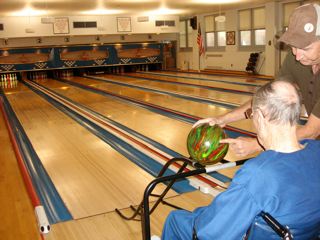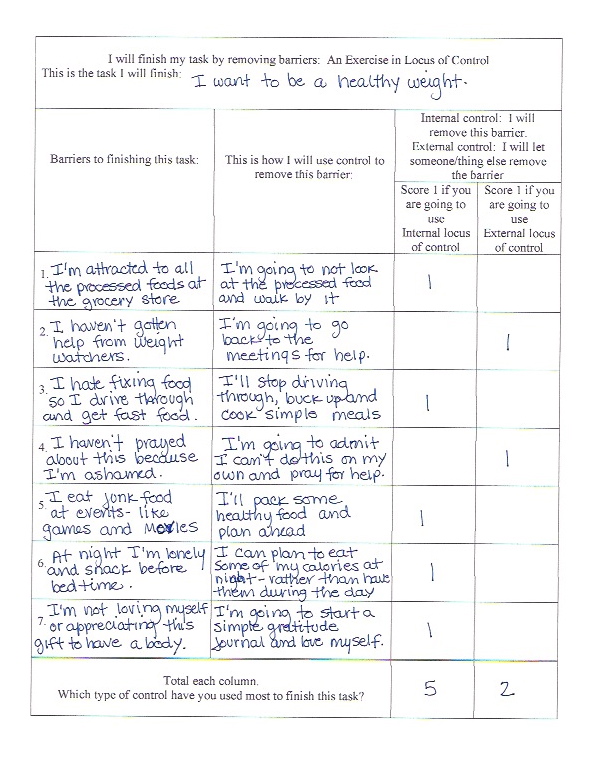
This is a picture of Mac. Mac bowled from a wheelchair at the Veteran’s Hospital. Some might argue that Mac had lost control. Others celebrated how he had control and was managing in his later years. This roll was the winning tournament strike. His award – a certificate for free food at the local canteen.
What is your concept of control? Are you able to manage what comes your way? Control is simply being deliberate in what you do. Control is on a continuum like the gravitational force from the center of the earth to the universe. To be in control or to manage, all you have to do is be deliberate in the moment — no matter what the circumstances or where you are on the continuum.
For instance, you jump up in the air. You get a foot off the ground. Gravity is the continuum that keeps you down. Another person might try and only get one finger off the wheelchair. Still another is on the moon, uses the same force, and jumps up ten feet. So what? Does one person have more control over the other? Control is simply the conscious choice to be deliberate no matter what the circumstance or where you are on some continuum. Accomplishing your mission will require a modicum of control.
Julian Rotter, an American psychologist, developed a social learning theory about personal control. He speculated people have two distinct types: external and internal locus of control. Locus means place or position. External locus of control means you “place” control outside yourself and feel manipulated and managed by forces beyond your control. People with strong external locus of control tend to disregard their own power and attribute their own successes or failures to people or things outside themselves. At worst they are whiners, not doers, continually feeling victimized by the world, and contributing little to society. At best they are followers and joiners who take advantage of community assets, resources, and what leaders provide.
On the other hand, people with internal locus of control attribute their successes and failures to their own behaviors. Their locus or place of control lies within their own self-confidence. At worst they become self absorbed, unappreciative of others’ relative contributions, narcissistic, and obsessively controlling. At best they are self-starters, movers and shakers, and people who are competent and willing to step in, lead, and get the job done.
A childhood tale tells the story of locus of control. In Grimm’s fairy tale Snow White and the Seven Dwarfs, the queen is jealous because her stepdaughter Snow White has a fairer complexion. The queen believes her happiness to be controlled by Snow White’s appearance. Had the queen been influenced by internal locus, she would have chosen to be happy regardless of Snow’s white skin. Unfortunately the queen’s obsession gets her sentenced to wearing hot shoes and dancing herself to death. What a price to pay for an external locus of control.
Finding and sustaining a mission depends on being able to gracefully switch between external and internal locus of control. There are times when you will have to submit or succumb to rules, regulations, another person’s foibles, a lack of resources, or any other untoward experience that causes you to fail or succeed in accomplishing something other than expected. However, there will be other times when you will be able to exercise control and force a situation to the desired end. In any case, remember Mac. When almost all his faculties had abandoned him, and when it appeared he had little control left in his body, his last bowl was a strike and his last expression was a smile. You too can have control on your mission. Claim your managing powers, have a wonderful life, and a mission you love.
Quote
“Learn from the past, set vivid, detailed goals for the future, and live in the only moment of time over which you have any control: now.
- Denis Waitley, Motivational Speaker
Activity
Activity: An Exercise In Locus of Control
Materials: The table below and a pencil
Time: Ten minutes to write and ten minutes per person to discuss each answer.
Instructions:
1. Print out the table below.
2. Fill out the table.
3. Discuss your answers with others in the group or with a friend or family member.
4. What did you learn about yourself by doing this activity?
5. How will this help you finish tasks in the future?
Example:
Here is a downloadable table for you to use. Click on the link below.
Affirmation
I am in control, so I can ........ We'd like to hear your story about being in control. Write your story below.
- « Previous lesson: Legally Fit: I obey the law
- » Next lesson: Compassionate: My life benefits others
